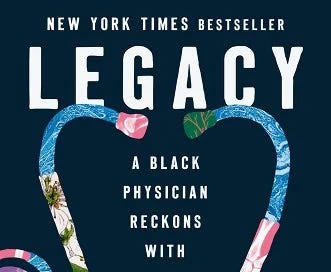Legacy: A Black Physician Reckons with Racism in Medicine
Or, all the reasons you distrust the healthcare system affirmed
Every system in this country is broken, especially health and healthcare. About ten years ago, I wrote a review of The American Health Care Paradox: Why Spending More is Getting Us Less, by Elizabeth Bradley and Lauren A. Taylor for Spirituality and Health magazine, which was around the time I was starting to transition from journalism into strategic communications and speechwriting, before my first full-time position as a speechwriter working at the Office of Minority Health.
The first line of that review as I drafted it reads: “In 2012, the U.S. healthcare industry made more than $849 billion, but Americans are far sicker than residents in other nations.” I’m so sure that the profit-driven healthcare system annually makes much more than that figure now and it makes me furious that among the Americans who are the sickest are Black.
So much of what I read in Legacy: A Black Physician Reckons with Racism in Medicine by Dr. Uché Blackstock, I already knew, both from my professional world and from my personal experience. Growing up poor in this country as the child of a mother with multiple mental health issues showed me all the cracks in the system, and how easy it was to slip through. I did not know what a primary care physician was until I was old enough to work a job with decent health insurance. I spent so much time at student dental clinics, I had no idea what it felt like to have (and afford) a primary dentist until I was nearly 40 years old. My main dental care consisted of a lot of Anbesol and aspirin.
There are millions of stories like mine, but Dr. Blackstock’s book is the first accounting of how racism moves in healthcare from the perspective of a Black woman physician, and that perspective matters greatly. Journalists I admire, like Linda Villarosa, and rappers I like, like Eve, have written similar personal accounts verified by data: Under the Skin opens with Linda’s jarring experience as a respected journalist having to ensure she was well-dressed at the hospital to keep the staff from treating them the way most non-Black people (notice I did not say white) treat us when we need care.
I just finished listening to Eve’s memoir, Who’s That Girl? and it was a cool listen; I didn’t expect to hear her talk about her fertility journey which resulted in the birth of her son, Wild, toward the end of the book, or the grueling, painful experience she had losing the baby that she carried before Wild was born. I immediately thought about Serena Williams and Beyonce — regardless of how much money, fame and clout these women have, racism has persistently reminded Black people that the systems in this country would rather that we die, that our children do not live, than to ensure that we can make it to the other side of whatever ails us.
This is one of many reasons Black people are generally raised with a good amount of distrust and with the belief that the healthcare system will not treat us as human. What system in America does? This includes points that Dr. Blackstock points out including Black people being used as guinea pigs without our consent, the enslaved Black women - Anarcha, Lucy and Betsey — who were operated on without their consent and without anesthesia by the so-called father of Gynecology.
I'm not a big fan of revisiting trauma — on my own behalf or that of others — in order to form the shape of a story to come. But I was drawn into Legacy by the love that shaped it and the defiant, clear vision that forms its calls to action. Dr. Blackstock’s story is so beautiful, beginning with her mother as a graduate of Harvard Medical School (“The original Dr. Blackstock”!) and the way she passed on that legacy to Dr. Blackstock and her twin sister, Oni, making them the first mother-daughter legacies from Harvard.
It was informative, if not surprising, to see in Legacy that the shameful ways that the American health and healthcare system ignores Black pain, disregards Black life from birth to death also extends to Black healthcare providers — because how could it not?You may not learn new information about the reach of racism in healthcare from reading Legacy, but this brave, thoughtful and honest account is worth reading as a powerful reminder of what we’re up against nonetheless.





I just finished this book. Excellent and essential reading.
Thank you, Joshunda Sanders, for your courage and intelligence not only to expose, but to establish a career and trajectory in unmask and debunk the wickkkered system of American Medical Apartheid.
The Black Book review website offers a cozy corner to relax, read and discover some of the most interesting, unhinged, and provocative literature of undergraded authors.
Keep up the combat and writing of informing, healing, and uplifting our people for the lack of knowledge with American culture deliberate driving force and a combination of socio-engineered Amerian Health Care Racism. What we don't know has been our assimilation noose wrapped around our necks. Too easy to get along we go along without amnesia. We have forgot the historical the enemy and our enmity purchased by assimilation and lack of revolutionary politics and black refined culture. Those who didn't want us here in the first place. We are a plunging to our demise for lack of political and social consciousness and ademedia.